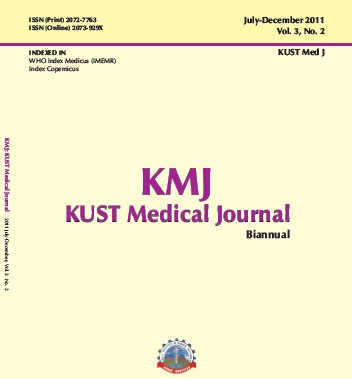Jejunoileal atresias: Bishop Koop procedure in neonates
Main Article Content
Abstract
Objective: To find out the efficacy of Bishop Koop procedure in terms of duration of hospital stay, postoperative complications and survival rate for jejunoileal atresias (JIA) in neonates in our setup.
Material and Methods: This retrospective study was carried out at Pediatric unit, Khyber Teaching Hospital, Peshawar. Cases of JIA admitted from January 2009 to June 2010 were retrospectively analyzed. Patient’s age, sex, weight, type of delivery; gestational age, clinical presentation, associated anomalies, management and outcome were recorded from ward register. Nineteen neonates with age of 5 days and above , with a weight < 3 kg and cases having lower jejunal and ileal atresias were included in the study.
Results: All 19 neonates (10 with jejunal atresia and 9 with ileal atresia) underwent Bishop Koop procedure. Type 3(a) was the most common (68.42%) atresia seen in the series. The mean age was 5.83 days and mean weight was 2.73kg. Postoperative hospital stay was 5-9 days (mean 5.78 days). Two patients (10.5%) died of postoperative leak from anastomotic site with septicemia while 17 (89.5%) patients survived. In 10 (52.6%) patients Bishop Koop chimney closed spontaneously, and in seven (36.8%) patients closure was done at the age of 1 year. Only one (5.3%) patient developed wound infection and one (5.3%) had adhesive intestinal obstruction; both were treated conservatively.
Conclusion: Bishop Koop procedure is a safe technique with good outcome in terms of decrease morbidity, mortality and short hospital stay thus helping in improving the survival. However more efforts are recommended to improve our intensive care to achieve better outcome.
Key Words: Jejunoileal Atresias, Bishop Koop Procedure, Neonates.
This article may be cited as: Imran M, Rehman HU, Rehman IU, Waheed T, Khan I. Outcome of Bishop Koop procedure in neonatal jejunoileal atresias: A retrospective analysis. KUST Med J 2011; 3(2): 52-56.
Article Details
Work published in KMUJ is licensed under a
Creative Commons Attribution 4.0 License
Authors are permitted and encouraged to post their work online (e.g., in institutional repositories or on their website) prior to and during the submission process, as it can lead to productive exchanges, as well as earlier and greater citation of published work.
(e.g., in institutional repositories or on their website) prior to and during the submission process, as it can lead to productive exchanges, as well as earlier and greater citation of published work.
